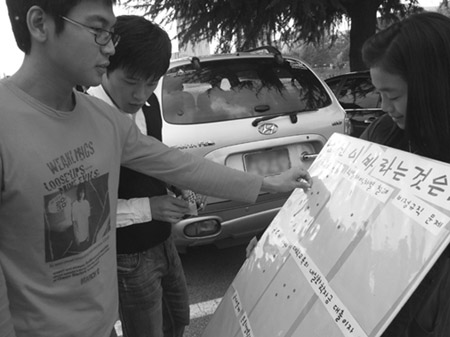
This December 19 will be the 17th presidential election day in
Power 19
Power 19 is an interesting group that has about 200 university students as its members. It was first established in 2006 by Daehakheemang (university hope), a student club that takes part in various social activities from volunteering to campaigning. “We collected 100,000 signatures from students, promising to vote in the regional election on May 31st last year. But, we thought it would be more effective if we could gather some specific requests from university students to give to the politicians,” said Kim Seon-kyeong (
According to Kim, finding out what university students want the most will certainly help people to participate more in politics. “Students get to know what our common concerns are,” said Kim. Lowering school tuition fees and creating more employment opportunities were the most frequent requests by students. “Based on these results, students can analyze and compare the candidates’ pledges and decide who will be most likely to meet their needs,” said Kim.
Power 19 also hosted a concert on November 9. “Unlike press conferences, which are somewhat formal, a concert with the objective of promoting students’ participation in politics seemed like it would appeal more to the students. I guess it is because of the concert atmosphere is similar to that of a festival, which allows students to enjoy themselves and freely share thoughts on the need to vote,” said Kim. Also, Power 19 created a video clip showcasing their hopes for the presidential election and posted it on the Internet. Before the election, Power 19 is planning to send its collected requests to the presidential candidates and it hopes to host a policy forum soon so that students and candidates can engage in extensive discussions.
University Voter Action
On October 8, University Voter Action’s establishment ceremony was held in Jongno. A group of students from 16 universities gathered with the common goal of encouraging more participation and fairness in politics. Performances highlighting the group’s requests and its determination to participate in the 17th presidential election were also held. Park Eun-jae (Chunbuk University, 4), the leader of UVA said, “Performances like giving a red card to a candidate who exacerbate regional discrimination, handing questions to candidates for open discussions, and printing hands on a placard to symbolize our participation in the election were all done to show our hopes for the presidential election.”
UVA also conducted a survey on students’ political awareness which is useful to help other organizations to find about the thoughts of university students. UVA calls its members and the roughly 350,000 other university students in
According to Park, UVA is planning to hold more activities before the election. They will host an open discussion session with the candidates, with students attending, monitoring, and examining the validity of the candidates’ pledges, host a relay lecture by the presidential candidates, keep running their website (www.u-hang.com), and so on.
“The youngest congressional representative in

